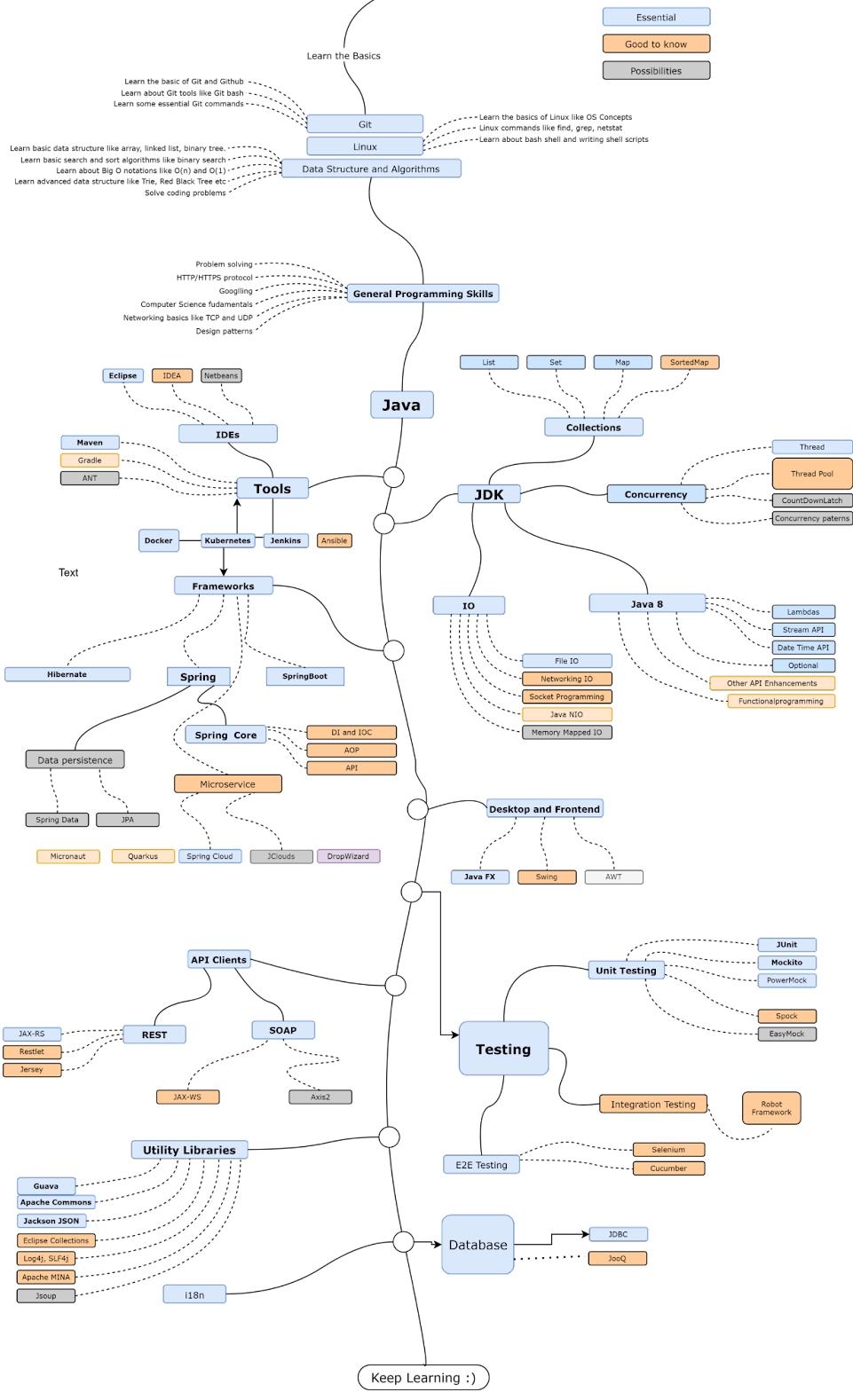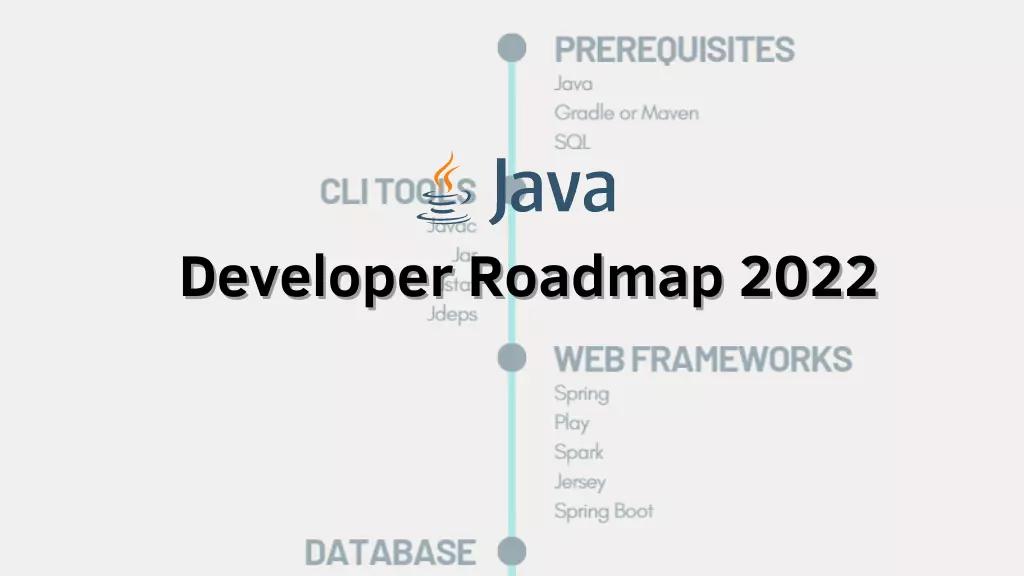2022 Java Developer Roadmap. So how long does it take to become a Java developer? Does it take ten months, ten weeks or a day? You may find odd and unspecific answers to the question on online forums. As it entirely depends on the learning capacity of an individual. But, it will not take more than 3 months to 12 months for a person to learn Java. The core aim of this roadmap is to help you identify what to learn next, rather than encouraging you to pick what’s in trend. Here you will find the list of technologies, tools and libraries that you might adapt to become a Java developer. Using which you will be able to know why you choose one tool over another.
2022 Roadmap To Become A Java Developer
Many of you might have already checked our previous blog on Java Developer Roadmap. However, today we are going to share a list of extended learning (as shown in the image) that is essential for your journey. The roadmap includes all the must-learn, good-to-know and might need technologies, tools and libraries you should be aware of.

What Does ‘To Learn & Know Java’ Mean?
In simple terms, being able to solve problems using Java will mean that you know Java. These problems might relate to clearing a Java developer’s job interview or doing a technical task (like creating your project or knowing how to write code that does what you want).
Certainly, your intricacies will evolve with time as you will want to grow your job profile. But when can you write you know Java in your resume? It is when you thoroughly understand Core Java. It is the first step you need to take to become a Java developer. You might be thinking, “what does Core Java cover?”.
To answer your question, Core Java comprises the fundamentals of the language. These fundamentals consist of basic types & objects, constructions (loops, special operators, branches), wrapper class, I/O Streams, multithreading, OOPs concept, and exception handling. It also includes libraries, frameworks, security, database access, networking, GUI development, and XML parsing.
So, your first goal should be learning the fundamentals of Java.
Top Required Skills To Become A Java Developer in 2022
How to become a Java Developer in 2022. Before moving on to the Tools, APIs, Frameworks, Testing, and Database, let’s acknowledge must-have skills to become a Java developer.
1. Linux
Linux is a widely used operating system for servers, databases, websites, and applications. It makes the Linux command line extremely important for developers. Therefore, learning Linux commands and concepts are highly recommended. Specifically, those commands that help with files, disk space checking, networking, and process management.
2. Git & Github
Git & Github are the widely used version control system and cloud-based hosting services for managing Git repositories, respectively. Both Git and Github offer valuable version-control functionality to the developers, which helps in the continuous development of the project without worrying about messing with other parts. As a developer, one needs to be familiar with essential concepts like a master, branch, checking push or pull, and checkouts. Apart from these, a developer should also know commands like git diff and git commit.
3. HTTP/HTTPS
HTTP/HTTPS protocol is the basis of the web. And for a developer, it is essential to know the difference between them, how they work, different HTTP methods, which one is more secure, which port each of them uses, and what is the purpose of both.
4. Data Structures & Algorithms
Programmers use data structures to store and organize data. On the other hand, algorithms are used by programmers to manipulate data inside data structures. The more you learn about the data structures & algorithms and how they work, the better Java programmer you will become. You must be familiar with concepts like linked lists, arrays, binary trees, stack, queue, graph, hash table and techniques like dynamic programming.
5. SQL
Another tech skill a Java programmer should know about is SQL. With the help of SQL, it becomes easier to troubleshoot backend issues. SQL provides the API for accessing and processing data that is stored in the database for Java. It helps in establishing a connection through DriverManager, provides standard mapping for SQL types to interfaces and classes, offers comprehensive information about the complete database, etc. By understanding SQL and its caveats like fragmented indexes or deadlocks, you will be able to understand the query database, stored procedures and find whether the problem is in the database layer or Java layer. SQL is a skill that a programmer can easily learn and use for a long time in their career.
6. Design Patterns
Design patterns are the well-described solutions to a set of common problems in software. It provides an industry-standard approach to overcome the recurring problems. Using design patterns enhances reusability that enables robust code while reducing the cost of ownership of the software. Moreover, design patterns make the code easier to understand and debug. The design patterns of Java is divided into three major categories, i.e. creational, structural, and behavioural. So by learning about the different design patterns of Java, you will be able to determine which one should be used and when.
Step by Step Roadmap for Java Programmers
Now that we have a basic knowledge of the skills that a Java programmer should know about. It is time to explore the roadmap and find out tools, libraries, APIs, or frameworks that help in becoming a professional Java developer this year.
1. Prerequisites
2. CLI Tools
3. Web Frameworks + Routers
-
Spark
-
Spring boot
4. Databases
-
Relational
-
Cloud Databases
-
Search Engines
-
NoSQL
5. ORMs
6. Caching
-
Distributed Cache
-
Java-Memcached
7. Logging
-
Log Frameworks
-
Log Management System
-
ELK Stack
-
8. Real-Time Communication
9. API Clients
11. Good to Know
-
Bouncy castle
12. Testing
-
Unit, Behavior, Integration, Load Testing
-
E2E Testing
13. Static Code Analysis
-
Code DX
-
CodeScene
14. Task Scheduling
15. Design Patterns
16. Microservices
-
Message-Broker
-
RabbitMQ
-
-
Message-Bus
-
Frameworks
-
RPC
Be Ready to Learn Consistently
Having said that if you need help with your existing projects then you hire developers from us, please contact us for free consultation and quotations.
Last but not least, one thing that you need to ensure is learning consistently. It is important to make progress even if it’s at a slow pace. On average, you should be learning Java for around 1-3 hours regularly. And yes, the major mistake that one makes while learning to program is only reading books! You can’t learn how to code without writing. Programming is a practical activity. To become a professional programmer of Java, start practising code as early as possible.

